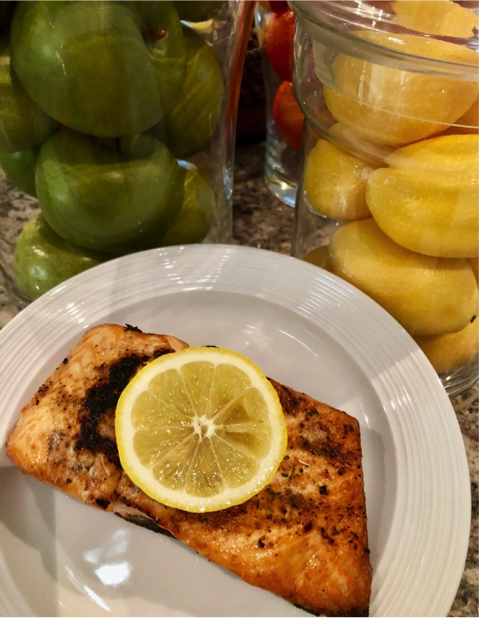Dietary fat has been a hot topic for years and if you grew up thinking fat was the devil during the low-fat craze of the 70s and 80s, you’re probably hella confused right now with this insanely popular ketogenic diet trend. Whether fat is completely discouraged (or encouraged), there’s a fine line between the good, the bad, and the ugly – so let’s face the facts about fat!
1. Your Body Needs Fat. Why?
Fat gives you energy
Fat helps your body grow and develop
Fat helps your body absorb vitamins A, D, E and K1
2. “Everyone should be treated equally.” Well… not for fats exactly. Different types of fats have different effects on your health!
The Good Fat – Unsaturated: All unsaturated fats are healthy. They can help improve your blood cholesterol levels and lower your risk of heart disease and stroke2. Unsaturated fats include monounsaturated and polyunsaturated fats.
Monounsaturated fats are naturally found in olive and canola oil, avocados and most nuts3,4.
Polyunsaturated fats include omega-3 and omega-6 fats. Omega-3 fats are found in fatty fish such as salmon, mackerel, trout and sardines, as well as canola and soybean oil. They can also be added to eggs, milk products and some juices. Omega-3 fats can help lower blood triglyceride levels and improve immune and inflammatory disorders3,4. Omega-6 fats on the other hand, are found in safflower, sunflower and corn oils, as well as some nuts and seeds3,4. Omega-6 fats can help lower LDL (bad) cholesterol, but in large amounts may also lower HDL (good) cholesterol so eat these in moderation!5
The Not-So-Good Fat – Saturated: Traditionally, saturated fats have been associated with increased LDL cholesterol and risk of cardiovascular disease and diabetes6. Saturated fats are commonly found in animal products such as fatty meat, poultry with the skin, and higher fat dairy products, as well as coconut oil and palm oil3,4. Highly processed foods (hot dogs, deli meats, burgers, donuts, fries, etc.) also contain a significant amount of saturated fat2. Newer research suggests saturated fats aren’t as bad for us as previously believed and can even help raise our HDL (aka ‘healthy’) cholesterol levels8. This being said, it’s still best to replace foods rich in saturated fat with unsaturated fat to lower the risk of heart disease (e.g. fish instead of steak) and choose lower fat dairy products and lean meats more often7.
The Ugly Fat – Trans: Trans fat is definitely an unhealthy fat and strongly associated with an increased risk of chronic health problems6. It’s industrially produced when vegetable oils are partially hydrogenated and adds flavour and texture to food4. Trans fat are most often found in commercially baked goods, fried foods and processed foods like packaged salty snacks2. Thankfully, Health Canada has banned the use of partially hydrogenated oils in foods as of September 2018, which will help eliminate trans fat from the food supply and reduce the consumption of trans fat by Canadians1.
Limit fats like:
Butter
Hard margarine
Lard and shortening
Higher fat dairy products (milk, cheese, yogurt)
Fatty cuts of meat and chicken with the skin
Now that you have a better understanding (I hope) of the role of fat, the different types of fat, and what foods contain them, you’re probably wondering “how do I make healthier fat choices”? In short, try to replace saturated and trans fat with unsaturated fats more often… and by that I mean, swap out the cream cheese with some nut butter or have salmon instead of BBQ ribs next time you’re out for dinner.
Use some of the tips below to jack up your healthy fat intake :)
Snack on a small handful of peanuts or nuts such as almonds or pecans
Spread peanut or nut butter on toast or bagels instead of butter
Toss slices of avocado into a salad
Sprinkle ground flaxseed, walnuts, or pumpkin seeds on cereal, yogurt, or salads
Use olive, canola, or peanut oil in cooking and baking
Choose fatty fish such as salmon, sardines, herring, mackerel and trout
Limit commercial baked goods, crackers, cookies, chocolate bars and deep-fried fast foods.2,4.
Rather, make some homemade baked goods like these and these.
WHAT'S THE BOTTOM LINE?
Fat, believe it or not, is an important part of our diet but unlike human rights, all fats should not be treated equally so choose wisely.
Side note – There are so many oils. Not sure which one to grab at the grocery store? Stay tuned in our next blog for more information on cooking oils as we dive deeper into the fat!
References:
1. Government of Canada. Fats [Internet]; 2019 [cited 2019 Sept 17]. 3 p. Available from:
https://www.canada.ca/en/health-canada/services/nutrients/fats.html
2. Dietitians of Canada. Dietary fat – the good, the bad and the ugly [Internet]; 2010 [cited 2019 Sept 17]. 3 p. Available from: https://www.tbdhu.com/sites/default/files/files/resource/2017-12/Dietary%20Fat%20The%20Good%20The%20Bad%20and%20The%20Ugly%20%28Dietitians%20of%20Canada%29.pdf
3. Government of Canada. Canada’s Food Guide: Choosing foods with healthy fats [Internet]; 2019 [cited 2019 Sept 17]. 2 p. Available from: https://food-guide.canada.ca/en/healthy-eating-recommendations/make-it-a-habit-to-eat-vegetables-fruit-whole-grains-and-protein-foods/choosing-foods-with-healthy-fats/
4. Dietitians of Canada. Facts on Fats [Internet]. In Unlock Food; 2018 [cited 2019 Sept 17]. 3 p. Available from: https://www.unlockfood.ca/en/Articles/Heart-Health/Facts-on-Fats.aspx
5. Hu FB, Manson JE, Willet WC. Types of dietary fat and risk of coronary heart disease: a critical review. J Am Diet Assoc. 2013 (20:1): 5-19, doi: 10.1080/07315724.2001.10719008
6. De Souza RJ, Mente A, Maroleanu A, Cozma A, Ha V, Kishibe T, Uleryk E, et al. Intake of saturated and trans unsaturated fatty acids and risk of all cause mortality, cardiovascular disease, and type 2 diabetes: systematic review and meta-analysis of observational studies. BMJ. 2015;351h;3978. doi:1 02.00;6/bmj.h;3978
7. Heart and Stroke Foundation of Canada. Dietary fats, oils and cholesterol [Internet]. Ottawa; 2018 [cited 2019 Sept 17]. 4 p. Available from: https://www.heartandstroke.ca/get-healthy/healthy-eating/fats-and-oils
8. V. L. Veum, J. Laupsa-Borge, O. Eng, E. Rostrup, T. H. Larsen, J. E. Nordrehaug, O. K. Nygard, J. V. Sagen, O. A. Gudbrandsen, S. N. Dankel, G. Mellgren. Visceral adiposity and metabolic syndrome after very high-fat and low-fat isocaloric diets: a randomized controlled trial. American Journal of Clinical Nutrition, 2016; DOI: 10.3945/%u200Bajcn.115.123463








Brooklyn Seal is currently completing her dietetic internship with a Master of Science in Foods and Nutrition at Western University. Prior to this, she earned her Bachelor of Applied Science in Human Nutrition from the University of Guelph. She is passionate about health and wellness and believes that balance is key. She loves being a part of a person’s journey in achieving their goals, while making sure the process is enjoyable. Above all, she aspires to help individuals improve their relationship with food and their body.